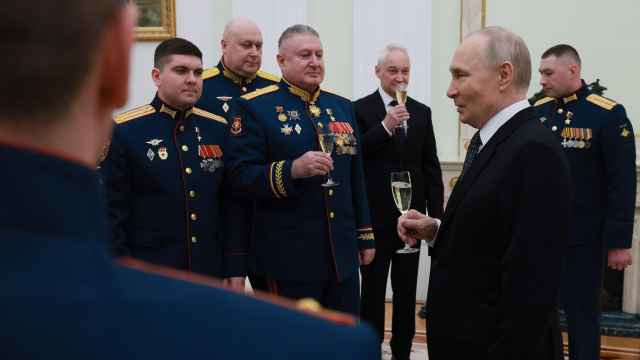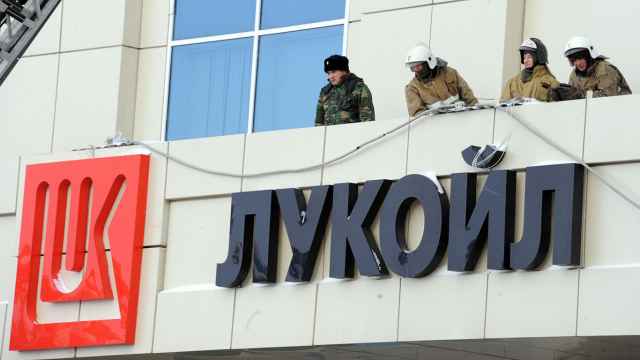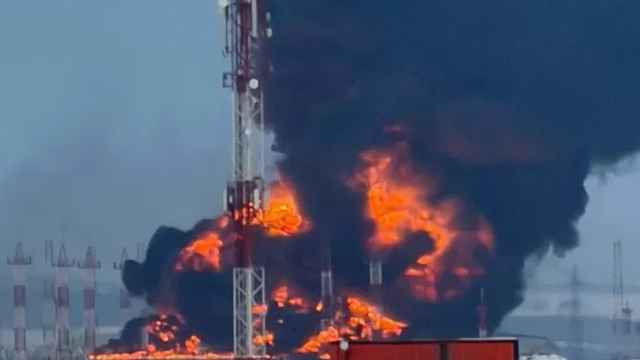Amid the fanfare and fireworks of Russia's Victory Day celebrations in May, President Vladimir Putin held a prolific round of talks with his Chinese counterpart Xi Jinping, signing 32 deals aimed at further shoring up ties between two superpowers unimpressed with Western dominance in the international community.
Key among these agreements was the decision by Putin and Xi to link their countries' key integration projects: the Russian-led Eurasian Economic Union and China's Silk Road Economic Belt. "Essentially, we seek ultimately to reach a new level of partnership that will create a common economic space across the entire Eurasian continent," Putin said of the agreement after the talks.
So long as this deal proves capable of materializing beyond diplomatic rhetoric, it will have long-lasting consequences for international relations at large, analysts interviewed by The Moscow Times said. Furthermore, by agreeing to deal directly with the Eurasian Economic Union, China has moved to dispel speculation that Putin is interested only in restoring Russia's former Soviet glory, experts said. Finally, the deal reveals a lack of desire on behalf of both countries to create a Cold War-like atmosphere, wherein Moscow and Beijing would find themselves competing against one another for influence in Central Asia.
Both countries come into the deal with plenty to offer the other. China has an enormous construction industry and manpower to match. In view of a decrease in the number of large-scale projects at home, these resources could be used to help build up transportation links and infrastructure throughout Eurasia.
In turn, Russia brings to the table diplomatic experience and security expertise specific to Central Asia.
"The logic of the Russia-China relationship has changed. A strategic partnership between the two has become a reality. Other states will have to learn how to deal with this new reality," said Alexander Gabuyev, chairman of the Russia in the Asia-Pacific Program at the respected Carnegie Moscow Center think tank.
Expert-Endorsed Move
Members of the Valdai International Discussion Club, who meet with Putin annually and enjoy direct access to the presidential administration, published a report in late April actively lobbying for Russia and China to forge closer ties.
According to one of its authors, Alexander Lukin, the report was received favorably by the Kremlin. "The fact that our leadership has agreed with experts is very positive. Both Russia and China are bound to obtain significant benefits from pooling their resources together," said Lukin, director of the Moscow State Institute of International Relations' Center for East Asian and Shanghai Cooperation Organization Studies.
Lukin added that Russia's First Deputy Prime Minister Igor Shuvalov has used ideas from the report in his speeches, and has been a leading proponent of the deal.
Dmitry Trenin, head of the Carnegie Moscow Center, authored his own report on the subject in May, arguing that while the old idea of a "greater Europe" spanning from Lisbon to Vladivostok has been abandoned, a new vision of a "greater Asia" from St. Petersburg to Shanghai has emerged as a more likely scenario for the region's future development.
"The epoch of post-Communist Russia's integration with the West is over," Trenin wrote in his report.
"All things considered, China turned out to be the biggest beneficiary of Russia's conflict with the West," he wrote. "Russia's confrontation with the United States will help mitigate Sino-Russian rivalries, mostly to China's advantage. But this doesn't mean Russia will be dominated by China; Moscow will likely find a way to craft a special relationship with its partner."
Immediate Implications
One of the earliest results to emerge from this new relationship will debut this week at the St. Petersburg Economic Forum, when Russia and China are expected to sign an agreement to build Russia's first dedicated high-speed railway, which will link Moscow with Kazan, the capital of Tatarstan.
Before the Ukraine crisis unfolded a year and a half ago, this project had been on track to be constructed with the help of European companies.
Meanwhile, a joint Russian-Chinese leasing company will soon spend more than $3 billion to purchase 100 Russian Sukhoi Superjets, another lucrative outcome of Putin's talks with Xi in May.
Speaking at a press conference last week, Prime Minister Dmitry Medvedev went so far as to express gratitude for the Western sanctions that have been imposed against Russia in waves since the start of the Ukraine crisis. These sanctions served as an impetus in the strengthening of Moscow's relations with its Eastern neighbors, Medvedev said.
"I thank all the states that have adopted these sanctions, and I say this absolutely sincerely," Medvedev said at the conference.
Looming Challenges
But despite the recent stream of uplifting news, Russia-China relations still face many challenges, not least of which is Russia's reluctance to occupy the No. 2 spot in the region.
This, however, may not be an insurmountable challenge. According to Trenin and Gabuyev, Chinese leaders will be wise enough to offer the Kremlin at least the illusion of equality. The same could never be said for the West.
"Chinese leaders are very pragmatic and for the Russian ones it is often enough to just seem important. Unlike the Westerners, the Chinese will never mentor Russia and insist on their superiority," Gabuyev said.
Perhaps most importantly, China and Russia are friendly with one another because they share a number of common views on the fundamentals of international order. Both emphasize the imperative of strong federal leadership, both see the global proliferation of democracy and human rights as covers for the West's crude foreign policy interests and both insist on the imperative of multipolarity within the international community, according to Trenin.
Unlike in Western states, Putin also enjoys widespread popularity in China, among whose population his popularity soared to 92 percent following Russia's annexation of Crimea last year, news site Slon.ru reported last week.
Still, experts have agreed that Russia will need to spearhead internal changes in order to be able to speak to China on equal terms.
"Though they have many lofty goals, the path to achieving these goals will be very difficult," Gabuyev said. "But at present, there is no alternative to China. The Russian elites would love to work in Europe and wake up in London. For Moscow to achieve its goals, these elites will have to face reality."
Contact the author at [email protected]
A Message from The Moscow Times:
Dear readers,
We are facing unprecedented challenges. Russia's Prosecutor General's Office has designated The Moscow Times as an "undesirable" organization, criminalizing our work and putting our staff at risk of prosecution. This follows our earlier unjust labeling as a "foreign agent."
These actions are direct attempts to silence independent journalism in Russia. The authorities claim our work "discredits the decisions of the Russian leadership." We see things differently: we strive to provide accurate, unbiased reporting on Russia.
We, the journalists of The Moscow Times, refuse to be silenced. But to continue our work, we need your help.
Your support, no matter how small, makes a world of difference. If you can, please support us monthly starting from just $2. It's quick to set up, and every contribution makes a significant impact.
By supporting The Moscow Times, you're defending open, independent journalism in the face of repression. Thank you for standing with us.
Remind me later.





